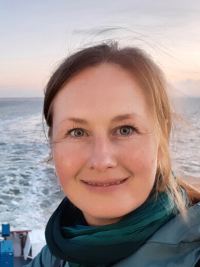NWO grant for Anastasiia Krushynska's MetaFlow project

Dr. Anastasiia Krushynska was awarded a grant from the Dutch Research Council (NWO) for her research project MetaFlow: Metamaterials and bio-inspired sensors to stabilize and monitor fluid flow and flow-induced vibrations. Anastasiia Krushynska is Assistant Professor on Dynamics and Vibrations at the Computational Mechanics and Materials Engineering (CMME) group at ENTEG. Co-applicant is Prof. Ajay Kottapalli of ENTEG.
NWO is awarding over 9.4 million euros to nine innovative PPP research projects on emerging key enabling technologies. The exploratory research has been awarded within the Emerging Key Enabling Technologies (KIC) call. This call provides space for pioneering PPP research around emerging key enabling technologies, focused on exploration and development of innovative ideas. These pioneering projects enable the public and private partners involved to take the next development step. Consortium partners are adding over 1.3 million euros in co-funding.
Metaflow
High-speed fluid flows in industrial pipelines are turbulent causing unwanted vibrations, noise, and threatening the safety of a system or device. MetaFlow proposes a unique approach to monitor and stabilize flows by combining extremely sensitive bio-inspired MEMS sensors and elastic metamaterials that can monitor and locally control flows actively in real-time through fine-tuned solid-fluid interactions. We will develop the setup demonstrating this technology and study practically relevant flow scenarios and pipeline dimensions. It will deliver ground-breaking results for understanding and stabilizing turbulent flows that will become new standards in flow control in industry and science, especially in high-precision applications.
Impactful technology
The aim of the Emerging Key Enabling Technologies call is to create a fertile seedbed for innovative, disruptive ideas. The technology is still so new that its disruptive nature has not yet been proven. This type of key technology is at a stage of broad potential application, where different sectors show interest in participating. An emerging key enabling technology has the opportunity to develop into a highly impactful technology that can contribute to industrial and/or societal impact in the longer term..
What is a key enabling technology?
A key enabling technology is characterised by a broad scope or reach in innovations and/or sectors. Key enabling technologies are essential in solving societal challenges and/or make a large potential contribution to the economy. They enable breakthrough process, product and/or service innovations. Key enabling technologies are relevant to science, society and industry. View the list of key enabling technologies.
Collaborative projects
Other projects involving the UG or the UMCG have also received grants. These are awarded to Prof. Dr. S.M. Garcia Blanco of the University of Twente with the UMCG as co-applicant, and to Prof. Dr. H. Corporaal of the TU Eindhoven with the UG as collaboration partner.
More news
-
29 January 2026
Microplastic research - media hype or real danger?
-
27 January 2026
ERC Proof of Concept grant for Maria Loi
